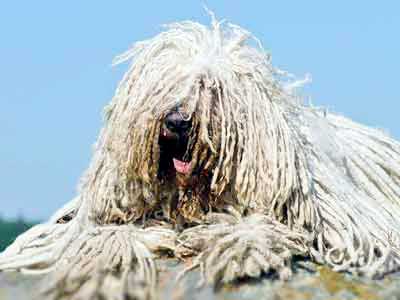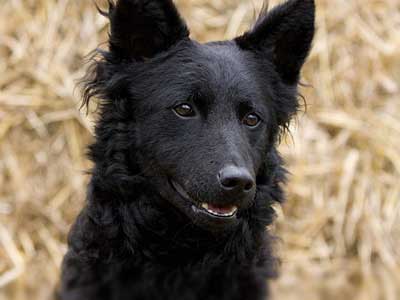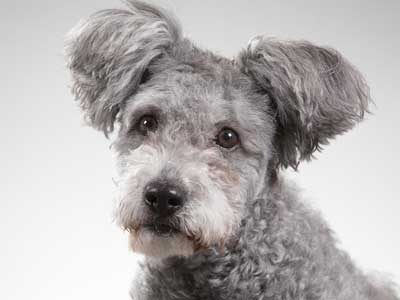Kuvasz
Breed Information |
|
|---|---|
| Popularity |
2022: #177 2021: #169 2020: #177 2019: #166 2018: #163 2017: #157 2016: #165 2015: #150 |
| Name | Kuvasz |
| Other names | Hungarian Kuvasz |
| Origin |  Hungary Hungary |
| Breed Group |
Working (AKC:1931) Guardian Dogs (UKC) |
| Size | Giant |
| Type | Purebred |
| Life span | 10-12 years |
| Temperament |
Clownish Independent Intelligent Loyal Patient Protective |
| Height |
Male: 28-30 inches (71-76 cm) Female: 26-28 inches (66-71 cm) |
| Weight |
Male: 100-115 pounds (45-52 kg) Female: 70-90 pounds (32-41 kg) |
| Colors | White |
| Litter Size | 6-8 puppies |
| Puppy Prices |
Average $1500 - $2500 USD While the average cost of a Kuvasz puppy is around $1,500, expect to pay $2,000 or more for a puppy that comes from a top breed line or parents with an excellent pedigree. The best way to find a breeder is to go on the AKC and CKC website and look for Kuvasz breeders that are registered with either kennel club. |
Breed Characteristics |
|
|---|---|
| Adaptability |
3 stars |
| Apartment Friendly |
1 stars The Kuvasz is not recommended for apartment life. It is fairly active indoors and does best with at least a large yard. |
| Barking Tendencies |
3 stars Occassional |
| Cat Friendly |
3 stars |
| Child Friendly |
4 stars Good with Kids: This is a suitable dog breed for kids. It is also very friendly toward other pets and shy toward strangers. |
| Dog Friendly |
3 stars |
| Exercise Needs |
3 stars The Kuvasz needs vigorous daily exercise. If it is not actively working as a flock guardian it needs to be taken on a daily, long brisk walk or jog. |
| Grooming |
3 stars Moderate Maintenance: The Kuvasz has a beautiful white double coat that sheds dirt but also sheds hair. Brush him weekly with a pin brush to remove dead hair and keep the skin and coat healthy. Trim the fur between his toes to keep his feet in good condition. His coat repels water and sheds dirt easily with brushing, so a bath is rarely necessary. |
| Health Issues |
4 stars Hypoallergenic: No |
| Intelligence |
4 stars Ranking: #42 Full Ranking List |
| Playfulness |
4 stars |
| Shedding Level |
4 stars Moderate Shedding: Expect this dog to shed regularly. Be prepared to vacuum often. Brushing will reduce shedding as well as make the coat softer and cleaner. |
| Stranger Friendly |
2 stars |
| Trainability |
4 stars Moderately Easy Training: Training won't require too much attention and effort, though it won't be easier than other breeds. Expect results to come gradually. |
| Watchdog Ability |
5 stars Great Watchdog Ability: This dog will bark and alert its owners when an intruder is present. It exhibits very protective behavior, acts fearless toward any aggressor, and will do what it takes to guard and protect its family. |
Kuvasz Names |
||
|---|---|---|
| Rank | Boy Names | Girl Names |
| 01 | Buddy | Bella |
| 02 | Max | Lucy |
| 03 | Toby | Molly |
| 04 | Jack | Sadie |
| 05 | Bear | Lulu |
| 06 | Jake | Penny |
| 07 | Milo | Luna |
| 08 | Zeus | Stella |
| 09 | Lucky | Zoe |
| 10 | Leo | Abbie |
| 100 Cute Puppy Names › | ||
Overview |
|---|
|
The Kuvasz is a giant dog, slightly longer than tall, and medium-boned. It is not bulky, but instead light-footed, with a free, easy gait. The breed's combination of power and agility stems from its versatile roots as a guardian, hunter and herder. Its double coat is medium-coarse, ranging from wavy to straight. Despite its sweet looks, the kuvasz is a tough protector, fearlessly defending its family or home. It is gentle with and protective of children in its own family, but it may misinterpret a child's rough-and-tumble games with other children as attacks on its child. It is reserved with strangers and may be aggressive toward strange dogs; however, it tends to be very gentle with other pets and livestock. It is devoted and loyal but not very demonstrative. Some can be domineering. |
History |
|
The Kuvasz (plural - Kuvaszok) is a very ancient breed. Its ancestors are believed to have been brought to Hungary, noted as its country of origin, as long ago as the 13th century. The breed is still found in that country. Their historical and present uses are as hunting dogs, flock guards and guard-companions. The first specimens of the breed were brought to the United States in the 1920's. |
References
- [1] ^ YouTube: Kuvasz - TOP 10 Interesting Facts
- [2] ^ FCI: KUVASZ Breed Standard





